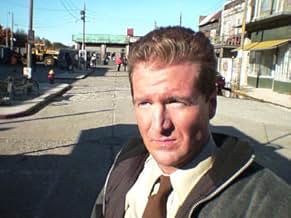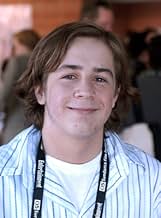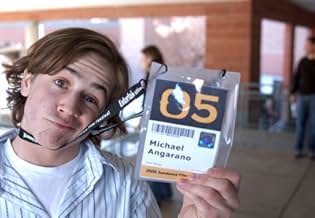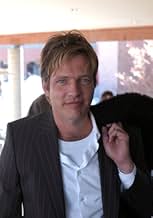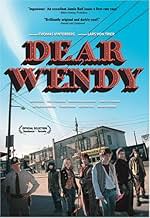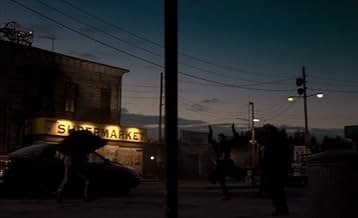NOTE IMDb
6,5/10
11 k
MA NOTE
Dans une ville américaine sans nom et intemporelle, un jeune garçon crée un gang de jeunes marginaux unis dans leur amour des armes et leur code d'honneur.Dans une ville américaine sans nom et intemporelle, un jeune garçon crée un gang de jeunes marginaux unis dans leur amour des armes et leur code d'honneur.Dans une ville américaine sans nom et intemporelle, un jeune garçon crée un gang de jeunes marginaux unis dans leur amour des armes et leur code d'honneur.
- Récompenses
- 1 victoire et 5 nominations au total
Avis à la une
Thomas Vinterberg has finally reemerged from the disaster that was "It's all about love", and with help from compatriot Lars Von Trier he has delivered a hugely original and entertaining film. The story evolves around Dick - a small town loser who feels confident by holding a gun. Seeing this, he creates a group "the Dandies" of fellow gun-fanatics. Violent as it may seem, the point of the group is pacifism - to obsess with guns, but NOT TO USE THEM. Yet when ex-criminal Sebastian joins the group tensions emerge, and Dicks ego and his gun-obsession becomes a deadly cocktail. The story is absolutely outrageous, but Vinterberg, realizing this, gives the film a warped, almost giddy, feel. This actually complements Von Trier's screenplay better than the latter's ultra-realistic style, and prevents the film from becoming moralizing. The only real drawback of the story is the slow start and the dialog, which at times has difficulty hiding the fact that it has, in fact, been translated from Danish into English. Nevertheless, a strong comeback for Vinterberg - let's hope he can do some more serious stuff as well.
I saw this movie in France with a large group of friends, something I highly recommend. We all seemed to have a different take on the film and each of us was able to draw something unique from it. Some loved it; some hated it. One of us focused on the powerful characters, another on the coming-of-age aspect, another on the gun control issues, etc. I saw it as a commentary on the power of fear in light of current world events and about how allowing that fear to control your life can ultimately bring about the very tragedy of which you are most afraid.
Dear Wendy certainly lends itself well to conversations that surpass the standard post-movie fare. I am looking forward to it coming stateside so I can see it again with other friends and see what reactions the film provokes in them ...
Dear Wendy certainly lends itself well to conversations that surpass the standard post-movie fare. I am looking forward to it coming stateside so I can see it again with other friends and see what reactions the film provokes in them ...
I liked "Dear Wendy". It was well photographed, had good cast and the rocking soundtrack provided the light icing on a film that is both sad and happy from the inside.
It is a bit puzzling that this film has been seen as anti-American propaganda. It does criticise the American values - but so do many American films that are hardly described as anti-American. The message is even softened by placing the film in surreal, small mining town that is so detached geographically that you can almost feel the fiction. In some sense it bears resemblance to the village set on Brechtian stage in "Dogville" (compare for example the "stageness" of main street) by Lars von Trier, whose touch can be seen in "Dear Wendy", too.
It can be also seen as an anti-gun lecture - but that is just one perspective to it and in my opinion also possible to ignore.
The only turnoff is the somewhat annoying narration by the main character, that explains too much and leaves less for the viewer to ponder. I might be also giving one star too much, because the end scene, where the film picks up the pace left such a strong impression on me, and not just because of being so well shot action.
It is a bit puzzling that this film has been seen as anti-American propaganda. It does criticise the American values - but so do many American films that are hardly described as anti-American. The message is even softened by placing the film in surreal, small mining town that is so detached geographically that you can almost feel the fiction. In some sense it bears resemblance to the village set on Brechtian stage in "Dogville" (compare for example the "stageness" of main street) by Lars von Trier, whose touch can be seen in "Dear Wendy", too.
It can be also seen as an anti-gun lecture - but that is just one perspective to it and in my opinion also possible to ignore.
The only turnoff is the somewhat annoying narration by the main character, that explains too much and leaves less for the viewer to ponder. I might be also giving one star too much, because the end scene, where the film picks up the pace left such a strong impression on me, and not just because of being so well shot action.
"Dear Wendy" comes from the talents that brought us "Festen" and "It's All About Love" (both written and directed by Thomas Vinteberg), "Dogville," "Dancer in the Dark" and "Breaking the Waves" (written and directed by Lars Von Trier). They have collaborated on Dear Wendy, with Vinteberg at the helm and penned by Trier.
This is my favorite kind of movie; it begins with a "what if..." premise, which the storytellers follow with relentless commitment. In this case, the premise is "what if some misfit kids fell in love with their guns." Well, they'd give them names, they'd practice shooting and have a secret clubhouse, they'd study the famous gun-toting heroes of old, and the relationship they have with their weapons would become a mirror for their relationships with the world. All of which are pursued beautifully in the film.
Quite a few American movie critics read this film as a critique of American society, and they resent a European making a film about small-town America. An oft-vented complaint is that Trier has no business criticizing a country which he's never actually visited. I don't think, however, that this is ultimately a film about guns; the relationship these kids have with their guns is simply a unique window through which the filmmakers have chosen to show us the rich inner lives of the protagonists. They could have used a dysfunctional family (Festen), or movie musicals (Dancer In The Dark) or a tolling church bell (Breaking The Waves) to show us that world - but in this case it's guns.
Within the limits of the film medium - 10,000 words of dialog and around 140,000 frames of film - the choices of the filmmaker often revolve about what to leave OUT rather than what to put IN. This is a film that could be used as a textbook for economists. The script is tight - not a word out of place, although the narration feels conversational and casual. A film about child misfits and their guns could easily follow thematic red herrings all over the place in pursuit of social commentary, but "Dear Wendy" is utterly restrained - in spite of the "loaded" subject matter. On the cutting room floor are social commentary, cliché, and many of the cinematic crutches which Trier and Vinterberg rejected in their Dogme 95 days.
Any film lover who cares to see a film utterly committed to its premise, a film made with economy and efficiency, a film full of sweet irony, a film of deceptive simplicity, would do well to check out "Dear Wendy."
This is my favorite kind of movie; it begins with a "what if..." premise, which the storytellers follow with relentless commitment. In this case, the premise is "what if some misfit kids fell in love with their guns." Well, they'd give them names, they'd practice shooting and have a secret clubhouse, they'd study the famous gun-toting heroes of old, and the relationship they have with their weapons would become a mirror for their relationships with the world. All of which are pursued beautifully in the film.
Quite a few American movie critics read this film as a critique of American society, and they resent a European making a film about small-town America. An oft-vented complaint is that Trier has no business criticizing a country which he's never actually visited. I don't think, however, that this is ultimately a film about guns; the relationship these kids have with their guns is simply a unique window through which the filmmakers have chosen to show us the rich inner lives of the protagonists. They could have used a dysfunctional family (Festen), or movie musicals (Dancer In The Dark) or a tolling church bell (Breaking The Waves) to show us that world - but in this case it's guns.
Within the limits of the film medium - 10,000 words of dialog and around 140,000 frames of film - the choices of the filmmaker often revolve about what to leave OUT rather than what to put IN. This is a film that could be used as a textbook for economists. The script is tight - not a word out of place, although the narration feels conversational and casual. A film about child misfits and their guns could easily follow thematic red herrings all over the place in pursuit of social commentary, but "Dear Wendy" is utterly restrained - in spite of the "loaded" subject matter. On the cutting room floor are social commentary, cliché, and many of the cinematic crutches which Trier and Vinterberg rejected in their Dogme 95 days.
Any film lover who cares to see a film utterly committed to its premise, a film made with economy and efficiency, a film full of sweet irony, a film of deceptive simplicity, would do well to check out "Dear Wendy."
8D_la
Up for the award for weirdest film I've seen in quite a while. You don't believe me? Okay, the plot revolves around Dick, who seems to have no friends at all and who lives in a small, nameless town in America that is totally centred on working in the mine. He buys a toy gun as a present for someone he doesn't like, but doesn't give it to him. Eventually he discovers that the gun isn't a toy at all, its real. He falls pretty much in love with this gun, names it Wendy, and forms a type of gang; The Dandies, who are pacifists although they do love their weapons.
Obviously, things do not work out well.
The whole style of the film is strange. Virtually all of it is narration, which is then developed in a few conversations or, and for the most part, shown and illustrated through what we see occur. It is also rather on the surreal side. I don't mean melting watches or anything, just, well surreal.
And I really liked it. The detached position the audience is placed in by not being able to engage with any of the characters except through the letters Dick writes/narrates. And the very fact that we're never quite sure what the film is about. Is it anti-gun, or just anti the culture that seems to love guns and violence yet wants to hide it away? Or is it a praise of their idealism? And lets not forget the humour. If you can't laugh at this film I don't think you'll enjoy it.
Obviously, things do not work out well.
The whole style of the film is strange. Virtually all of it is narration, which is then developed in a few conversations or, and for the most part, shown and illustrated through what we see occur. It is also rather on the surreal side. I don't mean melting watches or anything, just, well surreal.
And I really liked it. The detached position the audience is placed in by not being able to engage with any of the characters except through the letters Dick writes/narrates. And the very fact that we're never quite sure what the film is about. Is it anti-gun, or just anti the culture that seems to love guns and violence yet wants to hide it away? Or is it a praise of their idealism? And lets not forget the humour. If you can't laugh at this film I don't think you'll enjoy it.
Le saviez-vous
- AnecdotesIn Lars von Trier's script, the main characters were in their 20s. Director Thomas Vinterberg decided to change it, so they became children instead. Lars von Trier later stated that he thought the age change was a brilliant idea.
- GaffesThe plan of Electric Square labels "CENTRE POLE" using the British rather than the American spelling. The film was shot in Denmark and Germany rather than in West Virginia, USA.
- ConnexionsFeatured in Letters to Dear Wendy (2005)
- Bandes originalesShe's Not There
Written and Performed by The Zombies
Zombies Heaven, "Begin Here & Singles" (c)
Courtesy of Marquis Enterprises
Meilleurs choix
Connectez-vous pour évaluer et suivre la liste de favoris afin de recevoir des recommandations personnalisées
- How long is Dear Wendy?Alimenté par Alexa
Détails
- Date de sortie
- Pays d’origine
- Sites officiels
- Langue
- Aussi connu sous le nom de
- Calles peligrosas
- Lieux de tournage
- Sociétés de production
- Voir plus de crédits d'entreprise sur IMDbPro
Box-office
- Budget
- 50 000 000 DKK (estimé)
- Montant brut aux États-Unis et au Canada
- 23 106 $US
- Week-end de sortie aux États-Unis et au Canada
- 8 222 $US
- 25 sept. 2005
- Montant brut mondial
- 607 229 $US
- Durée
- 1h 45min(105 min)
- Couleur
- Mixage
- Rapport de forme
- 1.66 : 1
Contribuer à cette page
Suggérer une modification ou ajouter du contenu manquant


